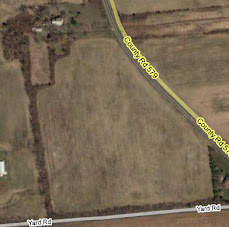
I have fantasized about living on a farm for as long as I can remember. Obviously, what I was picturing as a child was what most of us picture: a family farm with animals and fields of vegetables. I never imagined a farm to mean a monoculture of genetically modified soybeans as far as the eye could see harvested with a combine bigger than a tractor trailer and crops put in a grain silo which is automatically emptied into a passing train that has tracks right through the property. In fact, the language has caught up with the times. We don't even call the latter a farm. We call it an agribusiness.
Back in the late '80s when I moved to Vermont, there were picturesque dairy farms all around. Family farming in those days was considered a dying industry. I knew one dairy farmer fairly well. She and her family had been dairy farmers for generations, and to hear her tell the story it was the path to perdition (or at least poverty). The dairy farmers could not make a living on the prices they were able to get for milk. It was this very situation, in part, that brought us recombinant bovine growth hormone (rBGH) which when administered to cows makes them produce more milk and according to many pediatricians this is also the cause of early onset puberty in girls (which is apparently on the rise). The issue of labeling your milk as rBGH-free is flat out illegal in some states and is an embittered battle in others. Now, instead of the Vermont-style family dairy farm that was dying in my early adulthood, we have concentrated animal feeding operations that lock the cows in place and milk them by machine. This is not to say that the farmers in Vermont did not milk by machine, they did, but their cows were put out to pasture every single day in decent weather. The new agribusiness model does not put cows out to pasture each day. The Tess of the d'Urberville's Talbothy dairy with its milkmaids is now a relic of the distant past.
There is a resurgence now of another kind of farming that is sustainable, organic, local market farming. This is the kind of farming being done by some of my neighbors. But now that I actually DO live on a farm. I know that the term "organic" is a suspicious one. The resurgence in local eating is something I heartily support. I, for one am disgusted by the idea of all those chemicals being poured on the soil, not to mention the idea of genetically modified "frankenfoods." But you would be shocked at how extremely difficult it is even for a person who is informed and well read on these issues to avoid these foods.
One common genetic modification is to make a plant pest resistant by encoding pesticides right into the cellular structure of the plant. This modification makes the plant pest resistant by killing any pest that eats the fruit. As Jane Goodall says so well in her book Harvest for Hope, with traditional pesticides at least we had the psychological comfort of washing and peeling. But when the pesticides are added at the cellular level and pesticides exist in every cell of a plant, you can not rid the item of its pesticides. It is discomforting to know that for certain foods there is essentially no escape. You may say to yourself, "so I won't eat GM foods." Not so fast. The number one most commonly modified crop is corn. Anyone who read Michael Pollan's Omnivore's Dilemma can tell you that the one food we consume is vast quantities, in most cases without even realizing it, is corn. There is corn syrup is almost every processed food, not to mention corn starch, and other corn derived additives corn syrup solids and what have you. There are also corn chips, corn tortillas, popcorn and plain old buttered and salted corn on the cob. Lastly, the diets of almost all factory farmed livestock, yes all the beef, chicken and pork you see in the grocery store, is fattened for slaughter on corn. All the eggs you buy at the grocery are from chickens with a diet of almost all corn. The milk you buy was produced by cows on a diet of corn. You can try, buy you cannot escape Frankencorn.
I am now raising my own farm animals. I would like very much to get off this all-Frankencorn-all-the-time diet. My first efforts have to start with getting the animals off the stuff. It is very difficult to get any animal feeds that are not corn based or are made with heritage varieties (not genetically modified). If I could find it, it would probably be cost prohibitive. The next possible option is to grow my own. Try as you will, even this is no guarantee. If you neighbors are growing modified corn and your corn is pollinated by it, there you go, now your corn is genetically modified too, even if you planted a heritage breed. Unbelievably, you can be sued if the Monsantos of the world find one of their patented varieties growing in your field, even if you didn't plant it and don't want it.
Which brings me to the organic label. If it is this incredibly difficult to avoid the genetically modified food, how on earth can anything actually be "organic?" I know for a fact that somewhere in the life of that $15/lb organic white sharp cheddar cheese made from unpasteurized organic cow's milk, there was Roundup, genetically modified corn and God only knows what else. My assessment is that the label guarantees nothing. Even if you grow you own corn, and milk your own cow, you cannot completely rid yourself of all things synthetic, and this is very sad for us all.
Today's livestock count:
- 11 chickens (our new 6 month old Amercauna rooster appears in the picture above)
- 9 guinea hens
- 6 ducks
Tonight's menu:
Creamed chipped beef on toast. The toast was a homemade buttermilk whole wheat bread that was delicious but too soft to hold up to the slicer. Served with the last of my blueberries.
I attempted to pick some wild strawberries for breakfast tomorrow. I got about 12 berries--something beat me to it! At least we had some of them.







